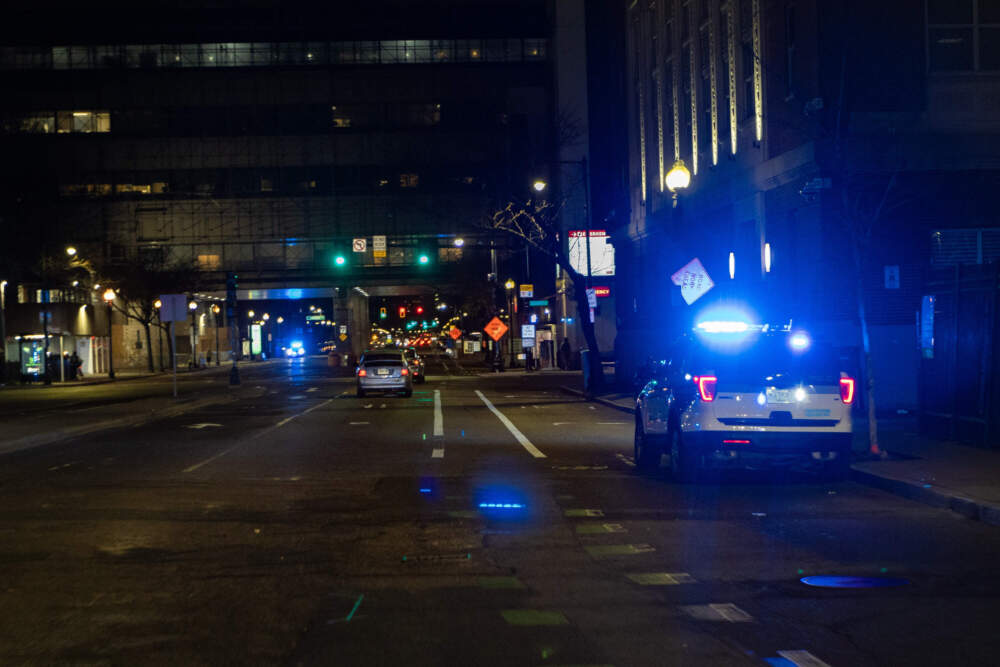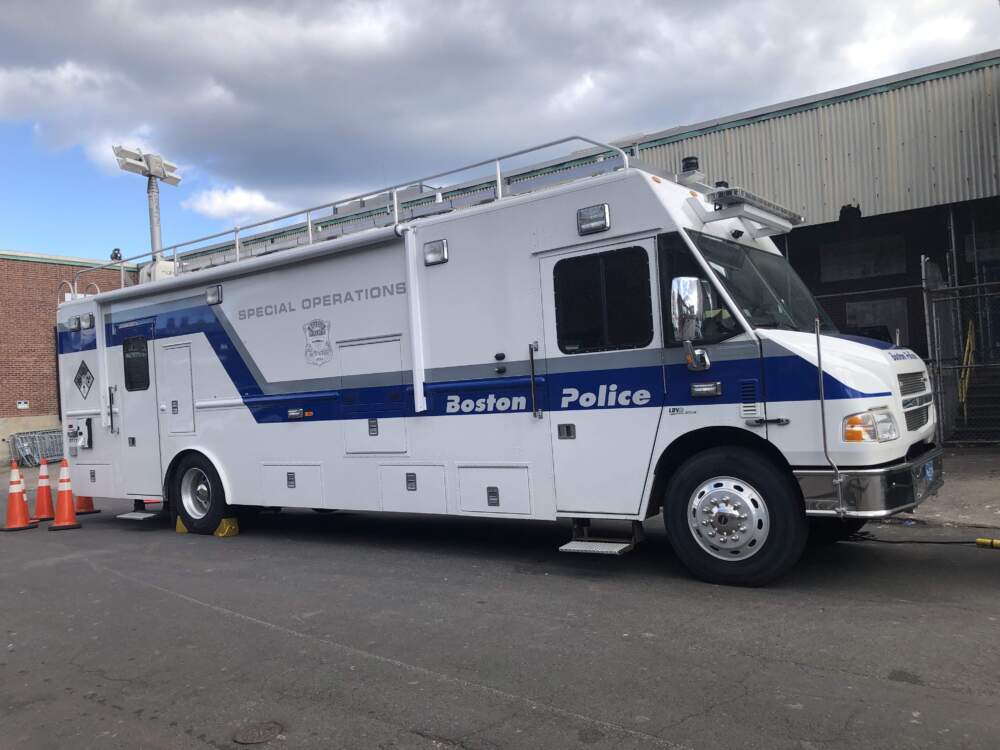Advertisement
The tents are gone from 'Mass. and Cass,' but concerns about care remain
ResumeIn the month since city workers cleared a large tent encampment near Boston's South End, the streets remain tent-free. Several law enforcement agencies are involved in the effort to keep it that way, raising concerns among lawyers and advocates about the impact to people seeking services for substance use disorders and mental health care.
The public safety agencies monitoring streets near the intersection of Massachusetts Avenue and Melnea Cass Boulevard on a recent day included state troopers, Boston police officers and officers with the Boston Public Health Commission.
A pair of police cruisers, a state police SUV and a Public Health Commission vehicle flanked the entrance to AHOPE, a needle exchange program on Albany Street.
"Let's go, let's go, let's go," a Public Health Commission officer told people who had gathered in front of the building. "Keep going. Get on the sidewalk."

A couple dozen people lingered on the steps leading to AHOPE, which is run by the Boston Public Health Commission. Some appeared to be under the influence of drugs; some tended to bloodied wounds on their arms and legs, which can result from injecting drugs.
AHOPE is one of the neighborhood's few remaining providers of substance use treatment and mental health services. The program serves about 300 people a day, according to the health commission, a 20% increase since before city workers and law enforcement officers dismantled the tent encampment.
The encampment was removed under city ordinance that took effect Nov. 1. It gives police more authority to clear tents and allows officers to arrest anyone who refuses to remove a temporary housing structure from the streets. It was approved as the city looked for new tools to address a worsening combination of violence, drug use and homelessness — before winter set in.
"They treat us like cattle. It's an ugly situation," said Linda Winn, 56, who said she frequently visits AHOPE. She doubted the new strategy would help improve the area.
"Everybody is just going to walk around, find a place to stay warm and move from one end of the street to another," she said.
Inside AHOPE's offices, the waiting room was crowded. The program provides services including clean supplies for drug use, testing for diseases such as HIV and hepatitis, and referrals to substance use disorder treatment.
Aidan Chick, 29, said he stays at a nearby shelter at night and visits the program during the day. He expressed frustration at the regular police presence in the neighborhood.
"The police have been nonstop harassing everybody," Chick said. "Pretty much since 9 a.m. to the end of the day, every day, we're moving every 20 minutes."
Chick said he and others go to the same places each day, remaining in one spot until the police tell them to leave, then moving on to the next location.
"It feels like there's a battle right now where it's like, who's gonna tire out first?"

Law enforcement and city officials defended their approach, saying it's aimed at protecting the health and safety of everyone who lives, works and spends time in the "Mass. and Cass" area. In response to questions from WBUR, Boston Mayor Michelle Wu's office said the city is working to "restore Atkinson as a functioning street" and police are "committed to maintaining the necessary staffing" to stop tents from returning.
The Boston Public Health Commission said it has two outreach teams in the area that reverse up to five overdoses a day. Another commission-run program placed more than 100 people in addiction treatment last month, a spokesperson said.
For weeks, Boston police maintained a mobile command center on Atkinson Street, where the tent encampment had been located. It consisted of a trailer, a mobile spotlight and, on a recent visit, a police truck. Late last week, city officials said the trailer had been removed.
The Engagement Center, which the city opened on Atkinson Street in December 2021 to offer services to people who need housing or are struggling with mental health and substance use disorders, remains closed.
Some advocates for people who are unhoused said it has become more difficult to find clients they were visiting in the encampment. Abigail Judge, co-founder of Boston Human Exploitation and Trafficking, said her organization still works with about 50 women who frequented the encampment. Judge said she's concerned by reports that police have arrested some women on minor charges. She said some of her clients fear they could be arrested if they walk in the area, and she's worried they will be discouraged from seeking services.
"The fact is that alongside or within the danger of the encampment, there was also help," Judge said "I think what people don't understand is just because people are dispersed and tents were removed, some individuals at a certain level of care have not suddenly become more motivated to recover [from substance use disorder]."
On Friday, a spokesperson for the city said Boston police have made 67 arrests in the area since Nov. 1, but none were related to violations of the encampment ordinance. The spokesperson said the city has partnered with the Suffolk County Sheriff's Department, so people arrested at "Mass. and Cass" can be booked and held for arraignment at the Suffolk County Jail.
Boston officials have described the situation in the neighborhood as still "fluid" and said their priority is to connect people with services. When the tents were cleared last month, the city reported 102 people received shelter or other assistance.
Speaking Thursday on WBUR's Radio Boston, Mayor Michelle Wu said more than three quarters of them are now in permanent, "low threshold" housing, which has fewer requirements to enter and remain housed. Wu said multiple city agencies are working to help those who remain in the area.
"The conversation is much more, 'How do we get you to where you could be safe, warm and have what you need?'" Wu said. "That has been happening all across the city, and we continue to find success in connecting people to services."
The Newmarket Business Association, which represents businesses in the area, said many are pleased the streets have been navigable for the past month. The association's executive director, Sue Sullivan, has been working with the city on how to improve the area. Sullivan said police are not arresting people for minor charges, but are dispersing crowds to prevent the drug dealing and violence that had become common in the encampment.
"It's important that the crowds are dispersed," Sullivan said. "What we have seen is that the drug dealers and the sexual predators and such are no longer hiding in tents and in big crowds. I am impressed that the city came up with a coordinated plan that got the drug dealers off the streets and away from preying on those that are in crisis."
This article was originally published on December 05, 2023.
This segment aired on December 5, 2023.
